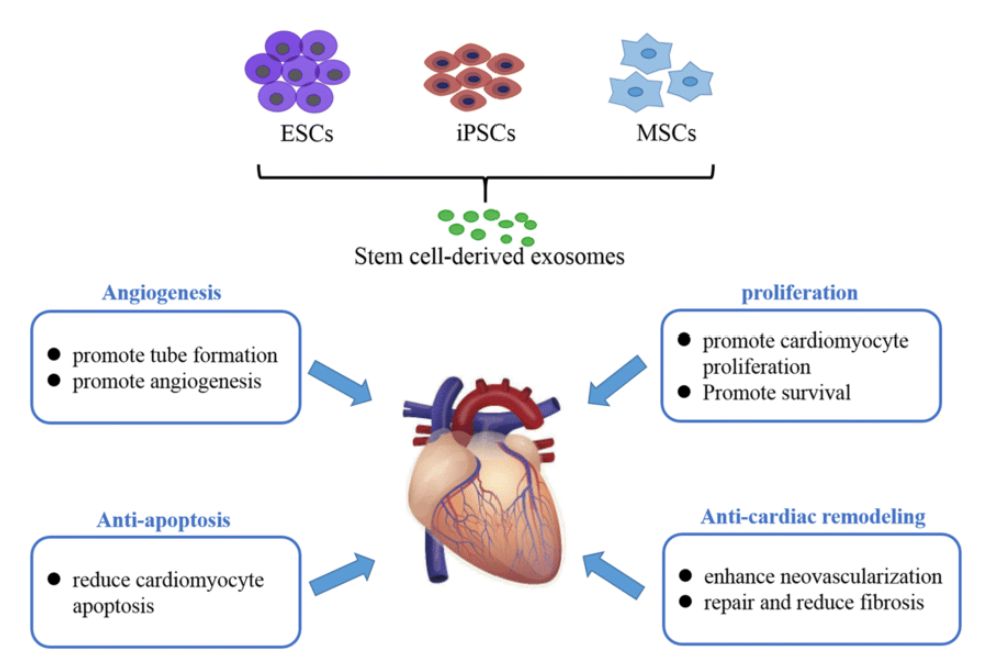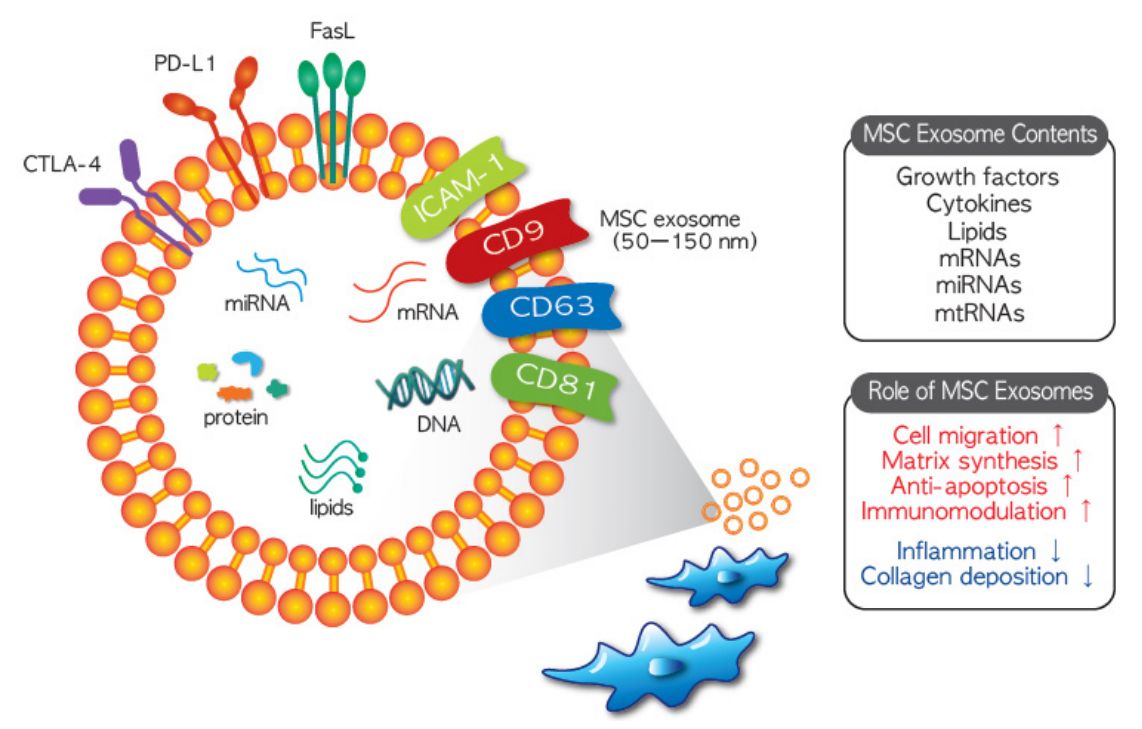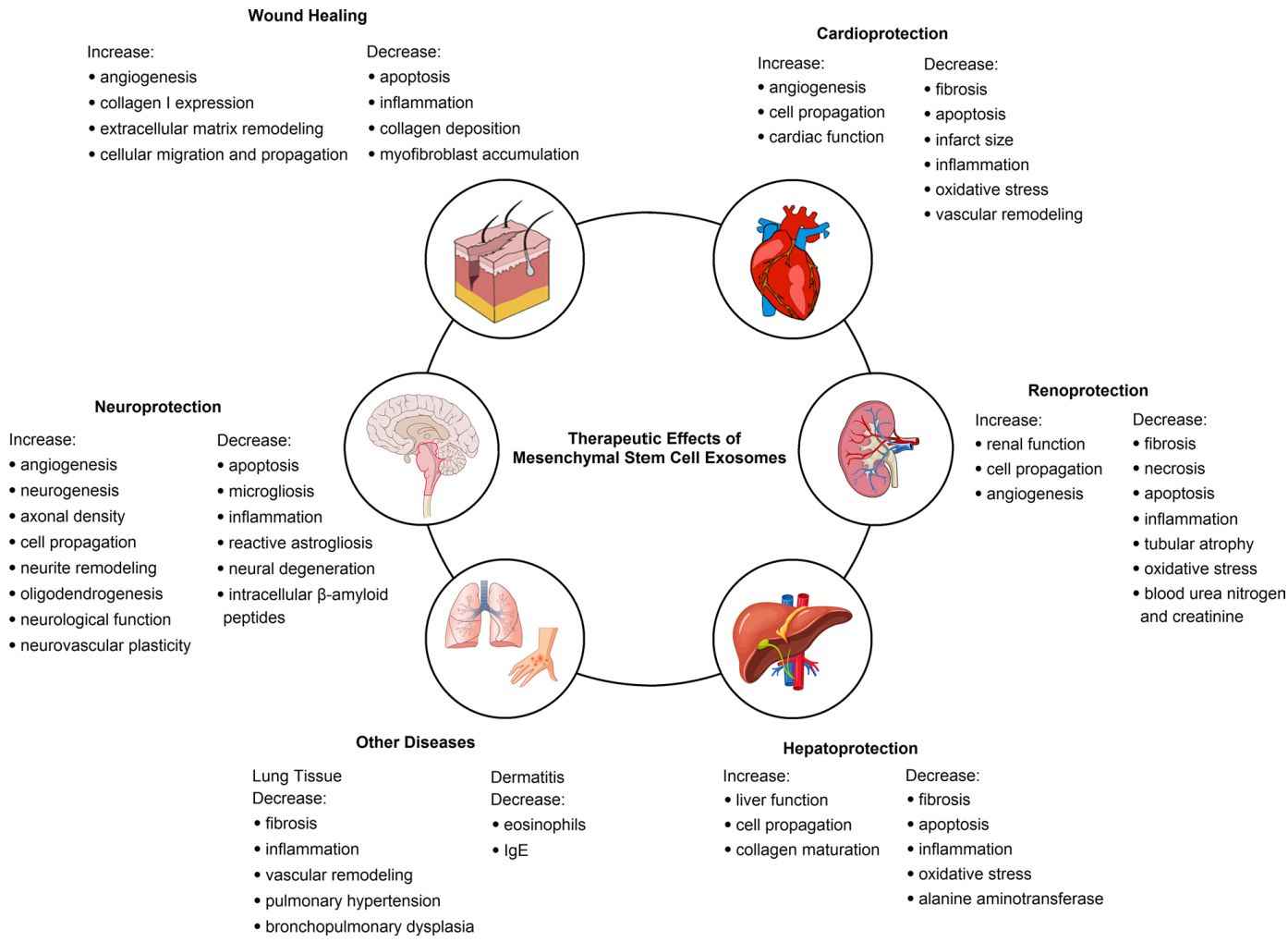What are Stem Cell-derived Exosomes (SC-Exos)?
Stem cells can be said to be a hot spot in the field of biomedicine in recent years that has attracted people's attention. Various research has proved that it has great potential in improving human diseases, slowing down aging and tissue regeneration. A closer look also reveals that in the many reports on the progress of stem cell research today, there is a figure that often appears, and that is - exosomes.
According to Dr. Klatz, President of the American Society for Anti-Aging Medicine, "Exosomes are the next step in stem cell technology." So what is this stem cell-derived exosome that researchers are clamoring for?
What are Stem Cell-derived Exosomes?
Exosomes are a class of extracellular vesicles 30-150nm in diameter that are primarily responsible for intercellular material transportation and information transfer. As a form of intercellular communication, almost all types of cells in the human body can secrete exosomes. Exosomes are widely present and distributed in various body fluids (e.g., blood, saliva, urine, cerebrospinal fluid, and milk), carrying a variety of proteins, mRNAs, miRNAs, and lipids.
Stem cells can secrete exosomes by paracrine action. Stem cell-derived exosomes have similar biological properties to stem cells but stem cell-derived exosomes are safer, more stable, and efficient, with stronger and more complex signaling molecules to transport and regulate them. In the absence of cell transplantation therapy, stem cell-derived exosomes provide a new strategy for achieving tissue regeneration and repair. Clinically, the commonly used stem cell-derived exosomes are mainly mesenchymal stem cell-derived exosomes (MSCs-Exos), embryonic stem cell-derived exosomes (ESCs-Exos), and induced pluripotent stem cell-derived exosomes (iPSCs-Exos).
 Figure 1. The overview of stem cell-derived exosomes. (He N, et al., 2020)
Figure 1. The overview of stem cell-derived exosomes. (He N, et al., 2020)
Advantages of stem cell-derived exosomes
- High safety
- Wide range of sources
- Easy to store and transport
- Fast-acting and efficient
Below are the high-quality stem cell-derived exosomes we offer
| Cat No. | Product Name | Source |
| Exo-SC01 | HQExo™ Exosome-PCS-500-011 | Exosome derived from human pre-adipose derived mesenchymal stem cell (PCS-500-011) |
| Exo-SC03 | HQExo™ Exosome-hTERT | Exosome derived from hTERT-immortalized Mesenchymal Stem Cell |
| Exo-SC04 | HQExo™ Exosome-MSC | Exosome derived from Xeno-Free Human Mesenchymal Stem/Stromal Cells and Media |
| Exo-SC02-1 | HQExo™ Exosome-PCS-500-012 | Exosome derived from human bone marrow-derived mesenchymal stem cell line (PCS-500-012) |
| Exo-SC02-2 | HQExo™ Exosome-Pla-MSC | Exosome derived from human placental derived mesenchymal stem cell |
| Explore All Exosomes Isolated from Stem Cell Lines | ||
What is Exosome Therapy?
Unlike stem cell therapy, exosome therapy does not involve the use of donor cells. Exosomes are isolated from mesenchymal stem cells (MSCs). MSC-Exo contains valuable lipids, mRNAs, miRNAs, and proteins, and can be administered via intravenous (IV) therapy or injected directly into the treatment area. Compared to stem cells, MSC-Exo contains nearly three times the amount of growth factors and has a greater ability to restore and activate target cells. Exosome therapy represents a breakthrough in regenerative medicine. This innovative treatment can be used to stimulate tissue regeneration and modulate the immune system.
What are MSC-derived Exosomes (MSCs-Exos)?
MSCs are the most commonly used source of exosomes. As an important member of stem cells, MSCs have the characteristics of self-renewal, multidirectional differentiation, immunomodulation, and can secrete a variety of active substances, and are an important stem cell population for tissue regeneration.
 Figure 2. Composition and therapeutic function of MSCs-Exos. (Lee B-C, et al., 2021)
Figure 2. Composition and therapeutic function of MSCs-Exos. (Lee B-C, et al., 2021)
- MSC-Exos in Immunomodulation
In recent years, with the in-depth study of exosomes, it has been found that MSC-Exos can effectively activate or inhibit immune responses. Studies have shown that MSC-Exo regulates immune cell responses by activating M2-type macrophages, inhibiting M1-type macrophages, and enhancing the expression of the anti-inflammatory cytokines IL-10 and TGF-β.
- MSC-Exos in Regenerative Medicine
It has been found that the RNA contained in exosomes is largely influenced by cell type and differentiation status and that MSC-Exos from different tissues have different properties. MSC-Exo contains RNA or proteins that can play a role in cellular homing and regulate cellular proliferation and differentiation, which can limit damage and promote cellular self-repair and tissue regeneration after cellular injury.
What are the Functions of Stem Cell-derived Exosomes?
Studies have shown that exosomes derived from different tissues have the same specific proteins as donor cells and also contain key molecules that perform functions. In other words, stem cell-derived exosomes have some of the characteristics of stem cells, such as differentiation and regeneration, low immunogenicity, and high survival rate after transplantation.
Stem cell-derived exosomes can effectively transport mRNA, microRNA, proteins, and other biologically active substances, and have important biological functions such as reducing apoptosis, attenuating inflammation, promoting angiogenesis, inhibiting fibrosis, and improving tissue repair potential, which has a good prospect for clinical application in the regulation of tissue regeneration.
 Figure 3. Functions of stem cell-derived exosomes. (Nikfarjam S, et al., 2020)
Figure 3. Functions of stem cell-derived exosomes. (Nikfarjam S, et al., 2020)
Stem Cell-derived Exosomes in Disease Treatment
- Cancer
Stem cell-derived exosomes can promote anti-tumor immune response, inhibit tumor proliferation, invasion, and metastasis, reduce angiogenesis, and improve drug sensitivity of tumor cells, which can positively affect the treatment of tumors.
- Cardiovascular Disease
Stem cell-derived exosomes promote myocardial regeneration by preventing cardiomyocyte apoptosis, inducing cardiogenesis in ischemic areas, and promoting cardiac stem cell survival, angiogenic capacity, and self-renewal.
- Nervous System Disorders
Stem cell-derived exosomes can cross the blood-brain barrier. In neurological repair, stem cell-derived exosomes protect neurons, promote axon regeneration, and protect blood-spinal cord barrier integrity.
- Bone and Joint Diseases
Stem cell-derived exosomes can promote bone healing and cartilage repair by inhibiting chondrocyte apoptosis, reducing extracellular matrix degradation, and promoting microangiogenesis. Its role in the treatment of osteoarthritis and femoral head necrosis has been highlighted.
- Ocular Diseases
Stem cell-derived exosomes play a role in regulating ocular cell migration, proliferation, apoptosis, immune response, and angiogenesis, and have been closely associated with ocular diseases such as diabetic retinopathy, macular schisis, traumatic optic neuropathy, glaucoma, and autoimmune uveitis.
- Lung-related Diseases
Stem cell-derived exosomes are involved in inflammatory lung diseases, including acute respiratory distress syndrome (ARDS) and bronchial asthma, and are relevant in the diagnosis and treatment of lung-related diseases.
Since exosomes inherit similar therapeutic effects of stem cells, e.g., anti-inflammation, immunomodulation, and tissue regeneration, they bring new ideas for the treatment of diseases. Clinical studies have demonstrated the potential of stem cell-derived exosomes in the field of disease treatment.
Creative Biostructure is committed to exosome research. We provide our clients with high-quality exosome products and one-stop exosome services to develop new therapies with stem cell-derived exosomes. If you would like to know more about our services and products, please feel free to contact us.
References
- He N, et al. Exosomes: Cell-Free Therapy for Cardiovascular Diseases. J Cardiovasc Transl Res. 2020. 13(5): 713-721.
- Lee B-C, et al. Therapeutic Features and Updated Clinical Trials of Mesenchymal Stem Cell (MSC)-Derived Exosomes. Journal of Clinical Medicine. 2021. 10(4): 711.
- Nikfarjam S, et al. Mesenchymal stem cell derived-exosomes: a modern approach in translational medicine. J Transl Med. 2020. 18(1): 449.